2023 was an eventful year for the Outreach Network for Gene Drive Research, characterized by noteworthy achievements and successes. As we enter 2024, we take a moment to look back and celebrate the highlights of the past year.
The year began with two inaugurations: both the University of California Malaria Initiative (UCMI) and Target Malaria inaugurated state-of-the-art insectaries and laboratory spaces. UCMI completed the development of a new insectary and molecular biology laboratory at the University of São Tomé and Príncipe (STP), to further their mission to contribute to the elimination of malaria. Target Malaria completed a new insectary and laboratory space at the University of Ghana to enhance infrastructure for mosquito research according to internationally recognized practices.
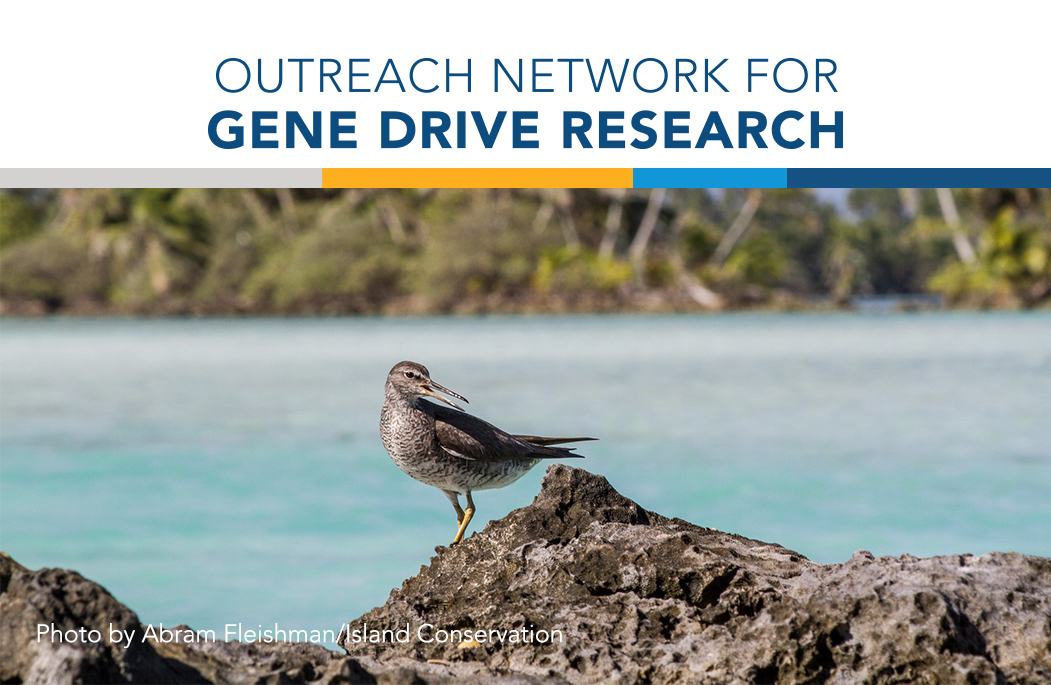
2023 was also marked by scientific breakthroughs and advancements. Researchers at the Ifakara Health Institute (IHI) and partners part of the Transmission Zero global malaria research programme developed the first transgenic mosquito strain to be made in Africa, demonstrating the successful development of local technical capacity and infrastructure to generate new genetic technologies which could contribute to the fight against malaria. Researchers from UCMI also made a significant advancement in the development of new malaria control tools by demonstrating the ability of a dual effector gene drive construct to reduce the prevalence of malaria in caged populations of Anopheles gambiae and Anopheles coluzzii mosquitoes. Strides were also made in enhancing the efficiency of gene drive systems in Aedes aegypti mosquitoes, a major vector of dengue and yellow fever. Researchers at The Akbari Lab in collaboration with researchers from UC Irvine proposed a novel CRISPR-based approach to modify Aedes aegypti mosquitoes, while researchers at the Alphey Lab, University of York and colleagues from the University of Oxford explored alternative pathways for efficient gene editing in these mosquitoes.
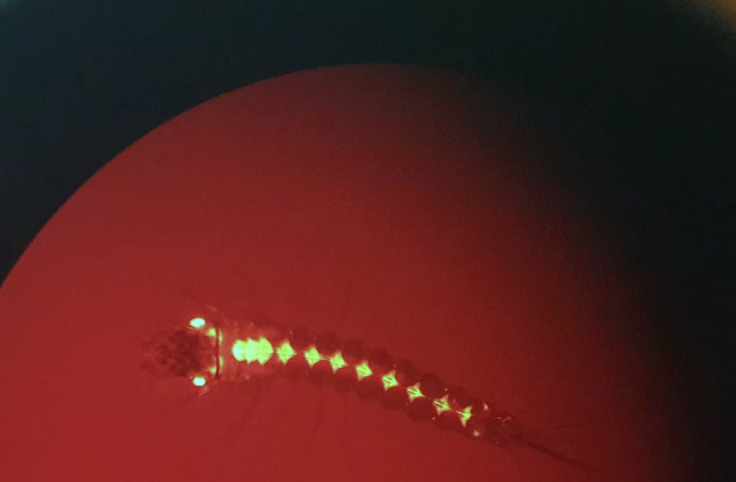 A transgenic mosquito larva through the lens of a microscope at the Ifakara Health Institute. Photograph: Ifakara Health Institute.
A transgenic mosquito larva through the lens of a microscope at the Ifakara Health Institute. Photograph: Ifakara Health Institute.
In March, a paper co-authored by Omar Akbari, The Akbari Lab, highlighted the value of using the term “gene drive” to describe both natural and synthetic genetic elements that promote their own transmission. In August, researchers from Target Malaria assessed the potential toxicity and allergenicity of a CRISPR-Cas9 gene drive for malaria control and found that releasing the gene drive into the environment should not pose increased risks to humans or animals. In September, researchers from the Liverpool School of Tropical Medicine (LSTM) looked at how CRISPR-Cas9 gene drives cope with genetic differences in Anopheles mosquitoes and demonstrated that gene drives can be applied effectively to diverse wild mosquito populations. In November, researchers from The Pirbright Institute and colleagues published a piece showing that CRISPR-based gene drives can generate super-Mendelian inheritance in the West Nile virus vector Culex quinquefasciatus, expanding the list of disease vectors that could potentially be controlled through gene drive technologies.
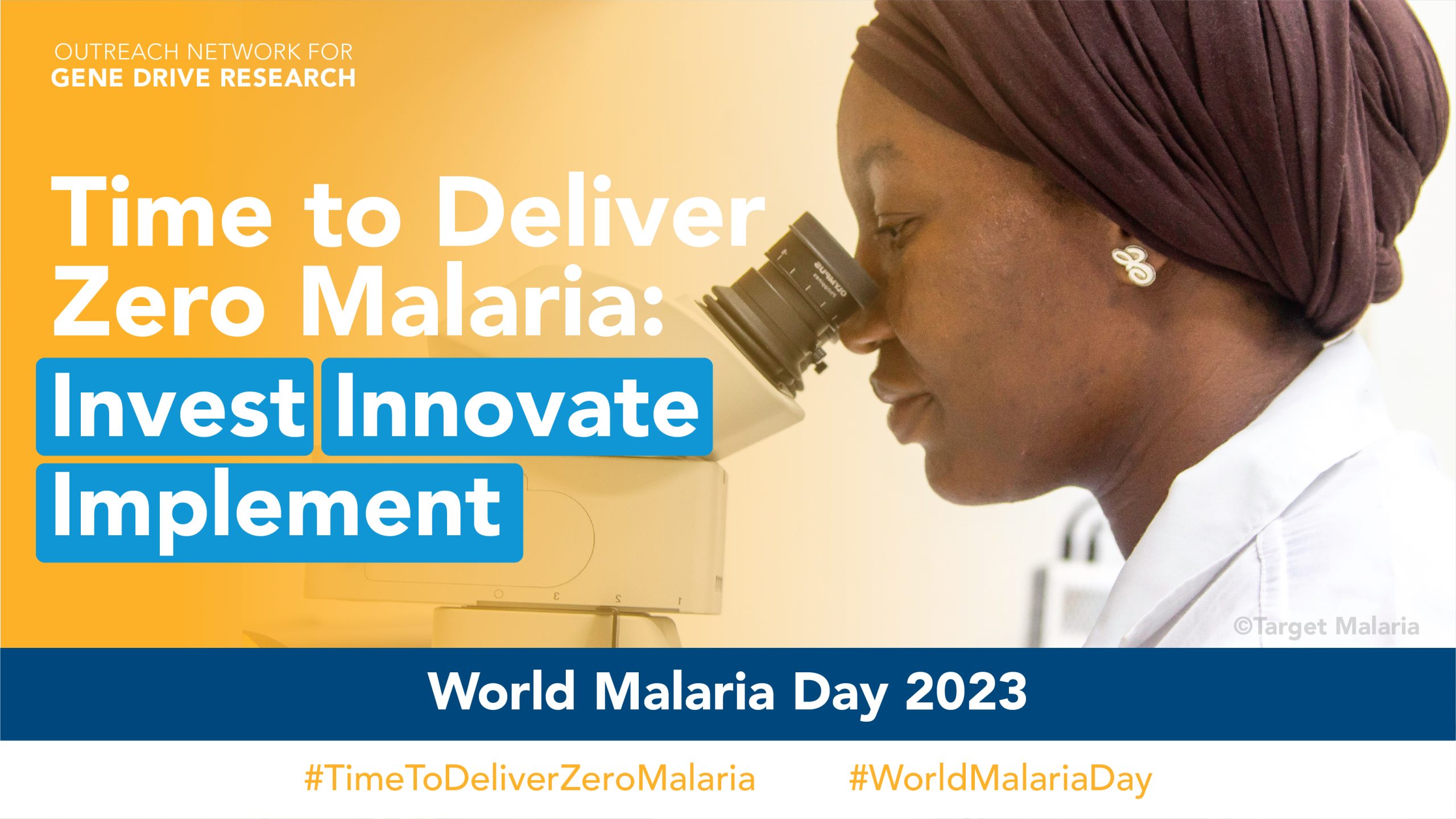 Outreach Network for Gene Drive Research – Vignette developed for the World Malaria Day Campaign.
Outreach Network for Gene Drive Research – Vignette developed for the World Malaria Day Campaign.
To celebrate World Malaria Day and World Mosquito Day this year, the Outreach Network organized two campaigns highlighting the profiles of researchers working on innovative approaches to tackle malaria and other vector-borne diseases. The campaigns allowed to foreground the importance of finding new tools to control malaria and showcase the valuable work carried out by researchers across member and partner institutions to develop new tools to fight vector-borne diseases.
In the field of biodiversity conservation, the end of the year saw the release of the Thematic Assessment Report on Invasive Alien Species and their Control by IPBES, which examines the magnitude of the threat posed by invasive alien species (IAS). The report showed that IAS have been a major factor in 60% of recorded global animal and plant extinctions and that the negative impacts of IAS are likely to continue rising in the future. These findings highlight the importance of developing new tools, such as gene drive applications, to help control populations of invasive alien species that threaten fragile ecosystems.
Conservation X Labs published its 2022 Annual Report showcasing how they are leveraging innovation, technology and entrepreneurship to avoid the sixth mass extinction. Island Conservation published its 2023 Impact Report, detailing a landmark year with the highest number of rewilded islands and protected species to date for the project, and emphasizing the vital role of science and innovation in these efforts.
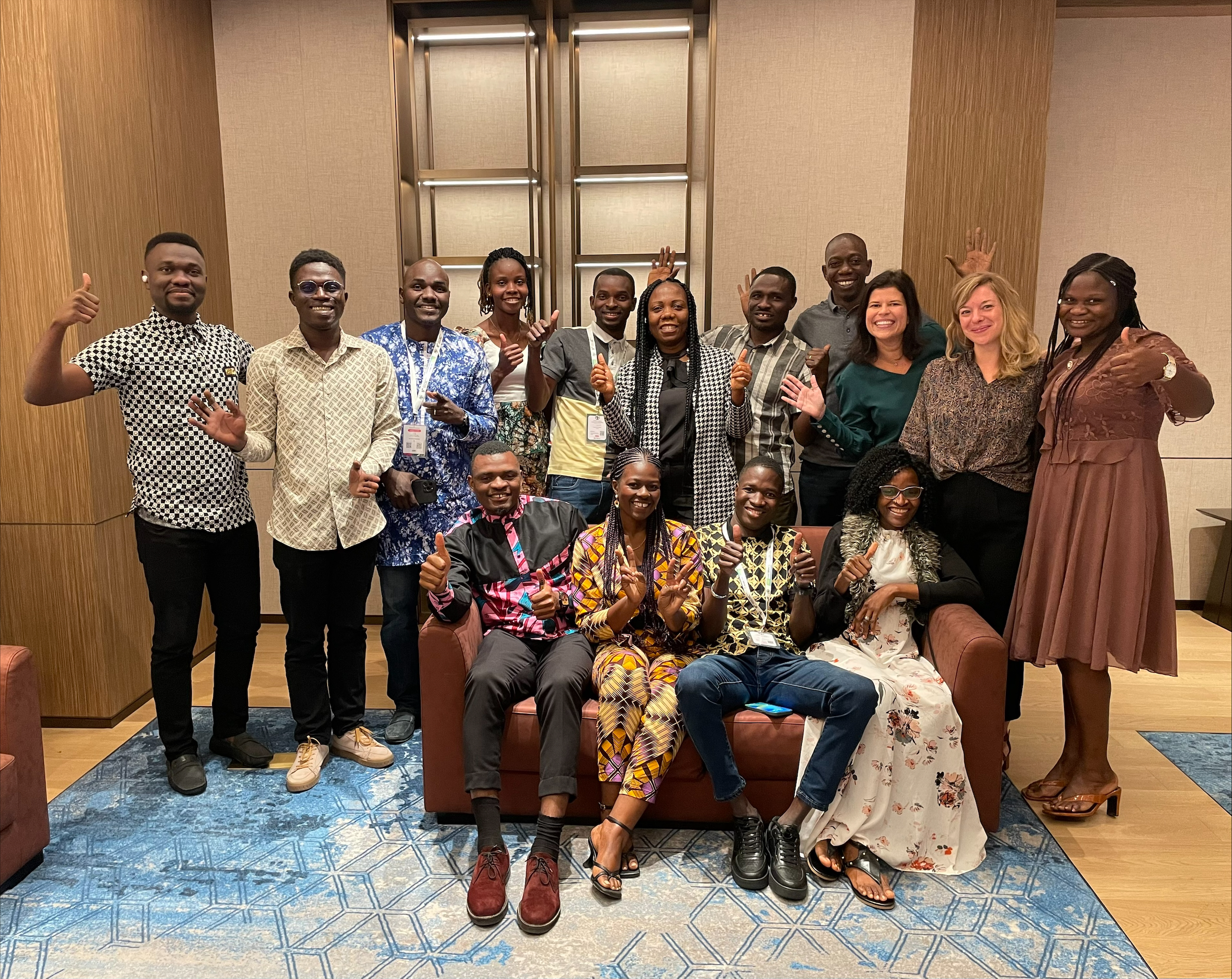 Facilitators and attendees of the policy engagement workshop hosted by the Outreach Network during PAMCA’s 9th Annual Conference in Addis Ababa, Ethiopia.
Facilitators and attendees of the policy engagement workshop hosted by the Outreach Network during PAMCA’s 9th Annual Conference in Addis Ababa, Ethiopia.
Several international conferences and webinars took place throughout the year. The Network organized a parallel session at the 16th ISBR Symposium, St. Louis, Missouri, on new developments in policy and governance of gene drives. The Network also hosted its second Policy Engagement Workshop at the 2023 PAMCA Annual Conference in Addis Ababa, Ethiopia, aimed at empowering young African scientists working in the vector control space to become effective advocates for their research. Many members of the Network took part in the conference, organizing sessions and delivering key presentations and trainings to participants, including the Foundation Gene Drive Short Course, which provided attendees with a basic technical understanding of gene drive technologies and their potential use in the fight against vector-borne diseases.
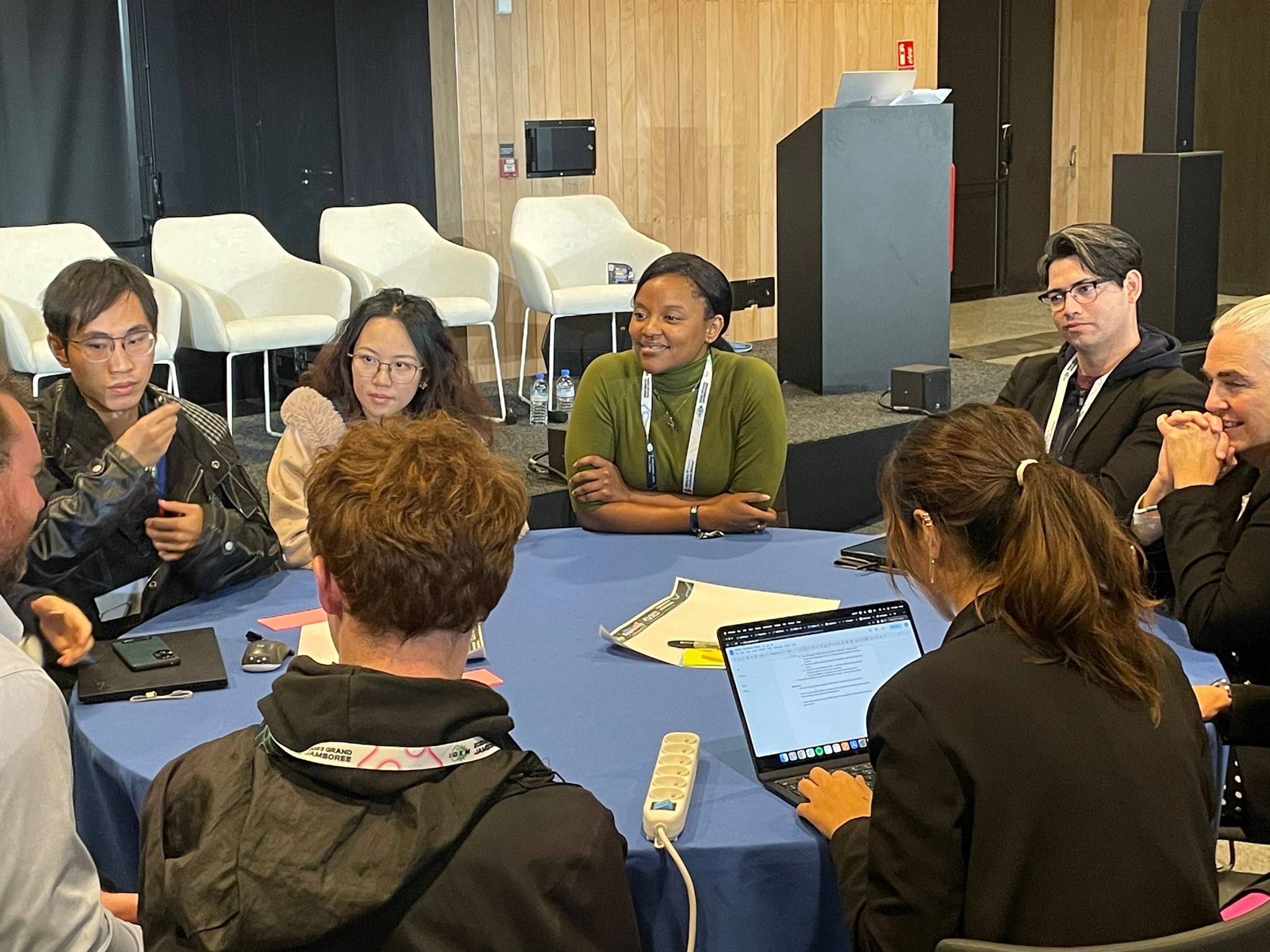 Naima Sykes, Target Malaria and other participants at an interactive event organized by the Outreach Network for Gene Drive Research at iGEM Foundation’s 2023 Grand Jamboree.
Naima Sykes, Target Malaria and other participants at an interactive event organized by the Outreach Network for Gene Drive Research at iGEM Foundation’s 2023 Grand Jamboree.
The last quarter of the year was busy for members of the Network, who engaged in key meetings and in-person conferences, such as the American Society of Tropical Medicine and Hygiene (ASTMH) Annual Meeting in Chicago, the Grand Challenges Annual Meeting in Dakar, iGEM Foundation’s Responsibility Conference in Paris, as well as the UK Mission to the EU’s One Health Fair’s event in Brussels, Belgium. These meetings allowed researchers to showcase their work and explore a variety of topics related to gene drive research, such as stakeholder engagement for health and conservation and innovative approaches for malaria control. The Network also organized a side event on the margins of the third International Conference on Public Health in Africa (CPHIA 2023) in Lusaka, Zambia, on how novel genetic approaches could be applied to achieve the African Union’s goal of eliminating malaria from the continent.
As for online events, IHI hosted many masterclasses throughout 2023, including on the use of Gene Drives for Malaria Elimination and the invasion and control of the invasive Anopheles stephensi mosquito in Africa. The Network and the Pan-African Mosquito Control Association (PAMCA) hosted two webinars on the basics of gene drive technologies and their applications for conservation and public health. The next one in the series will take place in March and will examine regulatory and governance considerations for gene drive research. For World Mosquito Day, the Network, in collaboration with the Asia Pacific Leaders Malaria Alliance (APLMA) and the Asia Pacific Malaria Elimination Network (APMEN) organized a webinar focused on novel genetic approaches to combat mosquito-borne diseases. The year ended with an online session of the 2023 Gene Drive Webinar Series on genetic tools for conservation and health, organized by ISAAA Inc., in partnership with the Network and the Malaysian Biotechnology Information Centre (MABIC), which gathered around 830 online participants.
 Moderator and panelists of the APMENxChange webinar: Genetic Approach to Vector Control: How can Gene Drive Help Control Malaria and Other Diseases?
Moderator and panelists of the APMENxChange webinar: Genetic Approach to Vector Control: How can Gene Drive Help Control Malaria and Other Diseases?
This year also marked the beginning of preparations for the Sixteenth meeting of the Conference of the Parties to the Convention on Biological Diversity (COP 16), scheduled for October 2024. Key developments included the start of open-ended online forums and submissions focused on synthetic biology and risk assessment of living modified organisms, which fostered informative discussions about critical topics for gene drive research. Additionally, the Network attended the 25th meeting of the Subsidiary Body on Scientific, Technical and Technological Advice (SBSTTA-25), where discussions around IAS and the development of indicators for the Kunming-Montreal Global Biodiversity Framework (GBF) continued to advance.
With this wrap-up, we bid farewell to 2023 and wish everyone a successful new year filled with new challenges and exciting breakthroughs. The coming year will be a busy one for the Network as we hope to continue to shed light on the value of gene drive research in addressing global health and biodiversity challenges.
Recent posts
